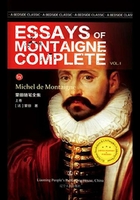Mr. Pickwick journeys to Ipswich and meets with a romantic Adventure with a middle-aged Lady in yellow Curl-papers
'That 'ere your governor's luggage, Sammy?' inquired Mr. Weller of his affectionate son, as he entered the yard of the Bull Inn, Whitechapel, with a travelling-bag and a small portmanteau.
'You might ha' made a worser guess than that, old feller,' replied Mr. Weller the younger, setting down his burden in the yard, and sitting himself down upon it afterwards. 'The governor hisself'll be down here presently.'
'He's a-cabbin' it, I suppose?' said the father.
'Yes, he's a havin' two mile o' danger at eight-pence,' responded the son. 'How's mother-in-law this mornin'?'
'Queer, Sammy, queer,' replied the elder Mr. Weller, with impressive gravity. 'She's been gettin' rayther in the Methodistical order lately, Sammy; and she is uncommon pious, to be sure. She's too good a creetur for me, Sammy. I feel I don't deserve her.'
'Ah,' said Mr. Samuel. 'that's wery self-denyin' o' you.'
'Wery,' replied his parent, with a sigh. 'She's got hold o' some inwention for grown-up people being born again, Sammy-the new birth, I think they calls it. I should wery much like to see that system in haction, Sammy. I should wery much like to see your mother-in-law born again. Wouldn't I put her out to nurse!'
'What do you think them women does t'other day,' continued Mr. Weller, after a short pause, during which he had significantly struck the side of his nose with his forefinger some half-dozen times. 'What do you think they does, t'other day, Sammy?'
'Don't know,' replied Sam, 'what?'
'Goes and gets up a grand tea drinkin' for a feller they calls their shepherd,' said Mr. Weller. 'I was a-standing starin' in at the pictur shop down at our place, when I sees a little bill about it; "tickets half-a-crown. All applications to be made to the committee. Secretary, Mrs. Weller"; and when I got home there was the committee a-sittin' in our back parlour. Fourteen women; I wish you could ha' heard 'em, Sammy. There they was, a-passin' resolutions, and wotin' supplies, and all sorts o' games. Well, what with your mother-in-law a-worrying me to go, and what with my looking for'ard to seein' some queer starts if I did, I put my name down for a ticket; at six o'clock on the Friday evenin' I dresses myself out wery smart, and off I goes with the old 'ooman, and up we walks into a fust-floor where there was tea-things for thirty, and a whole lot o' women as begins whisperin' to one another, and lookin' at me, as if they'd never seen a rayther stout gen'l'm'n of eight-and-fifty afore. By and by, there comes a great bustle downstairs, and a lanky chap with a red nose and a white neckcloth rushes up, and sings out, "Here's the shepherd a-coming to wisit his faithful flock;" and in comes a fat chap in black, vith a great white face, a-smilin' avay like clockwork. Such goin's on, Sammy! "The kiss of peace," says the shepherd; and then he kissed the women all round, and ven he'd done, the man vith the red nose began. I was just a-thinkin' whether I hadn't better begin too-'specially as there was a wery nice lady a-sittin' next me-ven in comes the tea, and your mother-in-law, as had been makin' the kettle bile downstairs. At it they went, tooth and nail. Such a precious loud hymn, Sammy, while the tea was a brewing; such a grace, such eatin' and drinkin'! I wish you could ha' seen the shepherd walkin' into the ham and muffins. I never see such a chap to eat and drink-never. The red-nosed man warn't by no means the sort of person you'd like to grub by contract, but he was nothin' to the shepherd. Well; arter the tea was over, they sang another hymn, and then the shepherd began to preach: and wery well he did it, considerin' how heavy them muffins must have lied on his chest. Presently he pulls up, all of a sudden, and hollers out, "Where is the sinner; where is the mis'rable sinner?" Upon which, all the women looked at me, and began to groan as if they was a-dying. I thought it was rather sing'ler, but howsoever, I says nothing. Presently he pulls up again, and lookin' wery hard at me, says, "Where is the sinner; where is the mis'rable sinner?" and all the women groans again, ten times louder than afore. I got rather savage at this, so I takes a step or two for'ard and says, "My friend," says I, "did you apply that 'ere obserwation to me?" 'Stead of beggin' my pardon as any gen'l'm'n would ha' done, he got more abusive than ever:-called me a wessel, Sammy-a wessel of wrath-and all sorts o' names. So my blood being reg'larly up, I first gave him two or three for himself, and then two or three more to hand over to the man with the red nose, and walked off. I wish you could ha' heard how the women screamed, Sammy, ven they picked up the shepherd from underneath the table-Hollo! here's the governor, the size of life.'
As Mr. Weller spoke, Mr. Pickwick dismounted from a cab, and entered the yard. 'Fine mornin', Sir,' said Mr. Weller, senior.
'Beautiful indeed,' replied Mr. Pickwick.
'Beautiful indeed,' echoes a red-haired man with an inquisitive nose and green spectacles, who had unpacked himself from a cab at the same moment as Mr. Pickwick. 'Going to Ipswich, Sir?'
'I am,' replied Mr. Pickwick.
'Extraordinary coincidence. So am I.'
Mr. Pickwick bowed.
'Going outside?' said the red-haired man. Mr. Pickwick bowed again.
'Bless my soul, how remarkable-I am going outside, too,' said the red-haired man; 'we are positively going together.' And the red-haired man, who was an important-looking, sharp-nosed, mysterious-spoken personage, with a bird-like habit of giving his head a jerk every time he said anything, smiled as if he had made one of the strangest discoveries that ever fell to the lot of human wisdom.
'I am happy in the prospect of your company, Sir,' said Mr. Pickwick.
'Ah,' said the new-comer, 'it's a good thing for both of us, isn't it? Company, you see-company-is-is-it's a very different thing from solitude-ain't it?'
'There's no denying that 'ere,' said Mr. Weller, joining in the conversation, with an affable smile. 'That's what I call a self-evident proposition, as the dog's-meat man said, when the housemaid told him he warn't a gentleman.'
'Ah,' said the red-haired man, surveying Mr. Weller from head to foot with a supercilious look. 'Friend of yours, sir?'
'Not exactly a friend,' replied Mr. Pickwick, in a low tone. 'The fact is, he is my servant, but I allow him to take a good many liberties; for, between ourselves, I flatter myself he is an original, and I am rather proud of him.'
'Ah,' said the red-haired man, 'that, you see, is a matter of taste. I am not fond of anything original; I don't like it; don't see the necessity for it. What's your name, sir?'
'Here is my card, sir,' replied Mr. Pickwick, much amused by the abruptness of the question, and the singular manner of the stranger.
'Ah,' said the red-haired man, placing the card in his pocket-book, 'Pickwick; very good. I like to know a man's name, it saves so much trouble. That's my card, sir. Magnus, you will perceive, sir-Magnus is my name. It's rather a good name, I think, sir.'
'A very good name, indeed,' said Mr. Pickwick, wholly unable to repress a smile.
'Yes, I think it is,' resumed Mr. Magnus. 'There's a good name before it, too, you will observe. Permit me, sir-if you hold the card a little slanting, this way, you catch the light upon the up-stroke. There-Peter Magnus-sounds well, I think, sir.'
'Very,' said Mr. Pickwick.
'Curious circumstance about those initials, sir,' said Mr. Magnus. 'You will observe-P.M.-post meridian. In hasty notes to intimate acquaintance, I sometimes sign myself "Afternoon." It amuses my friends very much, Mr. Pickwick.'
'It is calculated to afford them the highest gratification, I should conceive,' said Mr. Pickwick, rather envying the ease with which Mr. Magnus's friends were entertained.
'Now, gen'l'm'n,' said the hostler, 'coach is ready, if you please.'
'Is all my luggage in?' inquired Mr. Magnus.
'All right, sir.'
'Is the red bag in?'
'All right, Sir.'
'And the striped bag?'
'Fore boot, Sir.'
'And the brown-paper parcel?'
'Under the seat, Sir.'
'And the leather hat-box?'
'They're all in, Sir.'
'Now, will you get up?' said Mr. Pickwick.
'Excuse me,' replied Magnus, standing on the wheel. 'Excuse me, Mr. Pickwick. I cannot consent to get up, in this state of uncertainty. I am quite satisfied from that man's manner, that the leather hat-box is not in.'
The solemn protestations of the hostler being wholly unavailing, the leather hat-box was obliged to be raked up from the lowest depth of the boot, to satisfy him that it had been safely packed; and after he had been assured on this head, he felt a solemn presentiment, first, that the red bag was mislaid, and next that the striped bag had been stolen, and then that the brown-paper parcel 'had come untied.' At length when he had received ocular demonstration of the groundless nature of each and every of these suspicions, he consented to climb up to the roof of the coach, observing that now he had taken everything off his mind, he felt quite comfortable and happy.
'You're given to nervousness, ain't you, Sir?' inquired Mr. Weller, senior, eyeing the stranger askance, as he mounted to his place.
'Yes; I always am rather about these little matters,' said the stranger, 'but I am all right now-quite right.'
'Well, that's a blessin', said Mr. Weller. 'Sammy, help your master up to the box; t'other leg, Sir, that's it; give us your hand, Sir. Up with you. You was a lighter weight when you was a boy, sir.' 'True enough, that, Mr. Weller,' said the breathless Mr. Pickwick good-humouredly, as he took his seat on the box beside him.
'Jump up in front, Sammy,' said Mr. Weller. 'Now Villam, run 'em out. Take care o' the archvay, gen'l'm'n. "Heads," as the pieman says. That'll do, Villam. Let 'em alone.' And away went the coach up Whitechapel, to the admiration of the whole population of that pretty densely populated quarter.
'Not a wery nice neighbourhood, this, Sir,' said Sam, with a touch of the hat, which always preceded his entering into conversation with his master.
'It is not indeed, Sam,' replied Mr. Pickwick, surveying the crowded and filthy street through which they were passing.
'It's a wery remarkable circumstance, Sir,' said Sam, 'that poverty and oysters always seem to go together.'
'I don't understand you, Sam,' said Mr. Pickwick.
'What I mean, sir,' said Sam, 'is, that the poorer a place is, the greater call there seems to be for oysters. Look here, sir; here's a oyster-stall to every half-dozen houses. The street's lined vith 'em. Blessed if I don't think that ven a man's wery poor, he rushes out of his lodgings, and eats oysters in reg'lar desperation.'
'To be sure he does,' said Mr. Weller, senior; 'and it's just the same vith pickled salmon!'
'Those are two very remarkable facts, which never occurred to me before,' said Mr. Pickwick. 'The very first place we stop at, I'll make a note of them.'
By this time they had reached the turnpike at Mile End; a profound silence prevailed until they had got two or three miles farther on, when Mr. Weller, senior, turning suddenly to Mr. Pickwick, said-
'Wery queer life is a pike-keeper's, sir.'
'A what?' said Mr. Pickwick.
'A pike-keeper.'
'What do you mean by a pike-keeper?' inquired Mr. Peter Magnus.
'The old 'un means a turnpike-keeper, gen'l'm'n,' observed Mr. Samuel Weller, in explanation.
'Oh,' said Mr. Pickwick, 'I see. Yes; very curious life. Very uncomfortable.'
'They're all on 'em men as has met vith some disappointment in life,' said Mr. Weller, senior.
'Ay, ay,' said Mr. Pickwick.
'Yes. Consequence of vich, they retires from the world, and shuts themselves up in pikes; partly with the view of being solitary, and partly to rewenge themselves on mankind by takin' tolls.'
'Dear me,' said Mr. Pickwick, 'I never knew that before.'
'Fact, Sir,' said Mr. Weller; 'if they was gen'l'm'n, you'd call 'em misanthropes, but as it is, they only takes to pike-keepin'.'
With such conversation, possessing the inestimable charm of blending amusement with instruction, did Mr. Weller beguile the tediousness of the journey, during the greater part of the day. Topics of conversation were never wanting, for even when any pause occurred in Mr. Weller's loquacity, it was abundantly supplied by the desire evinced by Mr. Magnus to make himself acquainted with the whole of the personal history of his fellow-travellers, and his loudly-expressed anxiety at every stage, respecting the safety and well-being of the two bags, the leather hat-box, and the brown-paper parcel.
In the main street of Ipswich, on the left-hand side of the way, a short distance after you have passed through the open space fronting the Town Hall, stands an inn known far and wide by the appellation of the Great White Horse, rendered the more conspicuous by a stone statue of some rampacious animal with flowing mane and tail, distantly resembling an insane cart-horse, which is elevated above the principal door. The Great White Horse is famous in the neighbourhood, in the same degree as a prize ox, or a county-paper-chronicled turnip, or unwieldy pig-for its enormous size. Never was such labyrinths of uncarpeted passages, such clusters of mouldy, ill-lighted rooms, such huge numbers of small dens for eating or sleeping in, beneath any one roof, as are collected together between the four walls of the Great White Horse at Ipswich.
It was at the door of this overgrown tavern that the London coach stopped, at the same hour every evening; and it was from this same London coach that Mr. Pickwick, Sam Weller, and Mr. Peter Magnus dismounted, on the particular evening to which this chapter of our history bears reference.
'Do you stop here, sir?' inquired Mr. Peter Magnus, when the striped bag, and the red bag, and the brown-paper parcel, and the leather hat-box, had all been deposited in the passage. 'Do you stop here, sir?'
'I do,' said Mr. Pickwick.
'Dear me,' said Mr. Magnus, 'I never knew anything like these extraordinary coincidences. Why, I stop here too. I hope we dine together?'
'With pleasure,' replied Mr. Pickwick. 'I am not quite certain whether I have any friends here or not, though. Is there any gentleman of the name of Tupman here, waiter?'
A corpulent man, with a fortnight's napkin under his arm, and coeval stockings on his legs, slowly desisted from his occupation of staring down the street, on this question being put to him by Mr. Pickwick; and, after minutely inspecting that gentleman's appearance, from the crown of his hat to the lowest button of his gaiters, replied emphatically-
'No!'
'Nor any gentleman of the name of Snodgrass?' inquired Mr. Pickwick.
'No!'
'Nor Winkle?'
'No!'
'My friends have not arrived to-day, Sir,' said Mr. Pickwick. 'We will dine alone, then. Show us a private room, waiter.'
On this request being preferred, the corpulent man condescended to order the boots to bring in the gentlemen's luggage; and preceding them down a long, dark passage, ushered them into a large, badly-furnished apartment, with a dirty grate, in which a small fire was making a wretched attempt to be cheerful, but was fast sinking beneath the dispiriting influence of the place. After the lapse of an hour, a bit of fish and a steak was served up to the travellers, and when the dinner was cleared away, Mr. Pickwick and Mr. Peter Magnus drew their chairs up to the fire, and having ordered a bottle of the worst possible port wine, at the highest possible price, for the good of the house, drank brandy-and-water for their own.
Mr. Peter Magnus was naturally of a very communicative disposition, and the brandy-and-water operated with wonderful effect in warming into life the deepest hidden secrets of his bosom. After sundry accounts of himself, his family, his connections, his friends, his jokes, his business, and his brothers (most talkative men have a great deal to say about their brothers), Mr. Peter Magnus took a view of Mr. Pickwick through his coloured spectacles for several minutes, and then said, with an air of modesty-
'And what do you think-what do you think, Mr. Pickwick-I have come down here for?'
'Upon my word,' said Mr. Pickwick, 'it is wholly impossible for me to guess; on business, perhaps.'
'Partly right, Sir,' replied Mr. Peter Magnus, 'but partly wrong at the same time; try again, Mr. Pickwick.'
'Really,' said Mr. Pickwick, 'I must throw myself on your mercy, to tell me or not, as you may think best; for I should never guess, if I were to try all night.'
'Why, then, he-he-he!' said Mr. Peter Magnus, with a bashful titter, 'what should you think, Mr. Pickwick, if I had come down here to make a proposal, Sir, eh? He, he, he!'
'Think! That you are very likely to succeed,' replied Mr. Pickwick, with one of his beaming smiles. 'Ah!' said Mr. Magnus. 'But do you really think so, Mr. Pickwick? Do you, though?'
'Certainly,' said Mr. Pickwick.
'No; but you're joking, though.'
'I am not, indeed.'
'Why, then,' said Mr. Magnus, 'to let you into a little secret, I think so too. I don't mind telling you, Mr. Pickwick, although I'm dreadful jealous by nature-horrid-that the lady is in this house.' Here Mr. Magnus took off his spectacles, on purpose to wink, and then put them on again.
'That's what you were running out of the room for, before dinner, then, so often,' said Mr. Pickwick archly.
'Hush! Yes, you're right, that was it; not such a fool as to see her, though.'
'No!'
'No; wouldn't do, you know, after having just come off a journey. Wait till to-morrow, sir; double the chance then. Mr. Pickwick, Sir, there is a suit of clothes in that bag, and a hat in that box, which, I expect, in the effect they will produce, will be invaluable to me, sir.'
'Indeed!' said Mr. Pickwick.
'Yes; you must have observed my anxiety about them to-day. I do not believe that such another suit of clothes, and such a hat, could be bought for money, Mr. Pickwick.'
Mr. Pickwick congratulated the fortunate owner of the irresistible garments on their acquisition; and Mr. Peter Magnus remained a few moments apparently absorbed in contemplation. 'She's a fine creature,' said Mr. Magnus.
'Is she?' said Mr. Pickwick.
'Very,' said Mr. Magnus. 'very. She lives about twenty miles from here, Mr. Pickwick. I heard she would be here to-night and all to-morrow forenoon, and came down to seize the opportunity. I think an inn is a good sort of a place to propose to a single woman in, Mr. Pickwick. She is more likely to feel the loneliness of her situation in travelling, perhaps, than she would be at home. What do you think, Mr. Pickwick?'
'I think it is very probable,' replied that gentleman.
'I beg your pardon, Mr. Pickwick,' said Mr. Peter Magnus, 'but I am naturally rather curious; what may you have come down here for?'
'On a far less pleasant errand, Sir,' replied Mr. Pickwick, the colour mounting to his face at the recollection. 'I have come down here, Sir, to expose the treachery and falsehood of an individual, upon whose truth and honour I placed implicit reliance.'
'Dear me,' said Mr. Peter Magnus, 'that's very unpleasant. It is a lady, I presume? Eh? ah! Sly, Mr. Pickwick, sly. Well, Mr. Pickwick, sir, I wouldn't probe your feelings for the world. Painful subjects, these, sir, very painful. Don't mind me, Mr. Pickwick, if you wish to give vent to your feelings. I know what it is to be jilted, Sir; I have endured that sort of thing three or four times.'
'I am much obliged to you, for your condolence on what you presume to be my melancholy case,' said Mr. Pickwick, winding up his watch, and laying it on the table, 'but-'
'No, no,' said Mr. Peter Magnus, 'not a word more; it's a painful subject. I see, I see. What's the time, Mr. Pickwick?' 'Past twelve.'
'Dear me, it's time to go to bed. It will never do, sitting here. I shall be pale to-morrow, Mr. Pickwick.'
At the bare notion of such a calamity, Mr. Peter Magnus rang the bell for the chambermaid; and the striped bag, the red bag, the leathern hat-box, and the brown-paper parcel, having been conveyed to his bedroom, he retired in company with a japanned candlestick, to one side of the house, while Mr. Pickwick, and another japanned candlestick, were conducted through a multitude of tortuous windings, to another.
'This is your room, sir,' said the chambermaid.
'Very well,' replied Mr. Pickwick, looking round him. It was a tolerably large double-bedded room, with a fire; upon the whole, a more comfortable-looking apartment than Mr. Pickwick's short experience of the accommodations of the Great White Horse had led him to expect.
'Nobody sleeps in the other bed, of course,' said Mr. Pickwick.
'Oh, no, Sir.'
'Very good. Tell my servant to bring me up some hot water at half-past eight in the morning, and that I shall not want him any more to-night.'
'Yes, Sir,' and bidding Mr. Pickwick good-night, the chambermaid retired, and left him alone.
Mr. Pickwick sat himself down in a chair before the fire, and fell into a train of rambling meditations. First he thought of his friends, and wondered when they would join him; then his mind reverted to Mrs. Martha Bardell; and from that lady it wandered, by a natural process, to the dingy counting-house of Dodson & Fogg. From Dodson & Fogg's it flew off at a tangent, to the very centre of the history of the queer client; and then it came back to the Great White Horse at Ipswich, with sufficient clearness to convince Mr. Pickwick that he was falling asleep. So he roused himself, and began to undress, when he recollected he had left his watch on the table downstairs.
Now this watch was a special favourite with Mr. Pickwick, having been carried about, beneath the shadow of his waistcoat, for a greater number of years than we feel called upon to state at present. The possibility of going to sleep, unless it were ticking gently beneath his pillow, or in the watch-pocket over his head, had never entered Mr. Pickwick's brain. So as it was pretty late now, and he was unwilling to ring his bell at that hour of the night, he slipped on his coat, of which he had just divested himself, and taking the japanned candlestick in his hand, walked quietly downstairs. The more stairs Mr. Pickwick went down, the more stairs there seemed to be to descend, and again and again, when Mr. Pickwick got into some narrow passage, and began to congratulate himself on having gained the ground-floor, did another flight of stairs appear before his astonished eyes. At last he reached a stone hall, which he remembered to have seen when he entered the house. Passage after passage did he explore; room after room did he peep into; at length, as he was on the point of giving up the search in despair, he opened the door of the identical room in which he had spent the evening, and beheld his missing property on the table.
Mr. Pickwick seized the watch in triumph, and proceeded to retrace his steps to his bedchamber. If his progress downward had been attended with difficulties and uncertainty, his journey back was infinitely more perplexing. Rows of doors, garnished with boots of every shape, make, and size, branched off in every possible direction. A dozen times did he softly turn the handle of some bedroom door which resembled his own, when a gruff cry from within of 'Who the devil's that?' or 'What do you want here?' caused him to steal away, on tiptoe, with a perfectly marvellous celerity. He was reduced to the verge of despair, when an open door attracted his attention. He peeped in. Right at last! There were the two beds, whose situation he perfectly remembered, and the fire still burning. His candle, not a long one when he first received it, had flickered away in the drafts of air through which he had passed and sank into the socket as he closed the door after him. 'No matter,' said Mr. Pickwick, 'I can undress myself just as well by the light of the fire.'
The bedsteads stood one on each side of the door; and on the inner side of each was a little path, terminating in a rush-bottomed chair, just wide enough to admit of a person's getting into or out of bed, on that side, if he or she thought proper. Having carefully drawn the curtains of his bed on the outside, Mr. Pickwick sat down on the rush-bottomed chair, and leisurely divested himself of his shoes and gaiters. He then took off and folded up his coat, waistcoat, and neckcloth, and slowly drawing on his tasselled nightcap, secured it firmly on his head, by tying beneath his chin the strings which he always had attached to that article of dress. It was at this moment that the absurdity of his recent bewilderment struck upon his mind. Throwing himself back in the rush-bottomed chair, Mr. Pickwick laughed to himself so heartily, that it would have been quite delightful to any man of well-constituted mind to have watched the smiles that expanded his amiable features as they shone forth from beneath the nightcap.
'It is the best idea,' said Mr. Pickwick to himself, smiling till he almost cracked the nightcap strings-'it is the best idea, my losing myself in this place, and wandering about these staircases, that I ever heard of. Droll, droll, very droll.' Here Mr. Pickwick smiled again, a broader smile than before, and was about to continue the process of undressing, in the best possible humour, when he was suddenly stopped by a most unexpected interruption: to wit, the entrance into the room of some person with a candle, who, after locking the door, advanced to the dressing-table, and set down the light upon it.
The smile that played on Mr. Pickwick's features was instantaneously lost in a look of the most unbounded and wonder-stricken surprise. The person, whoever it was, had come in so suddenly and with so little noise, that Mr. Pickwick had had no time to call out, or oppose their entrance. Who could it be? A robber? Some evil-minded person who had seen him come upstairs with a handsome watch in his hand, perhaps. What was he to do?
The only way in which Mr. Pickwick could catch a glimpse of his mysterious visitor with the least danger of being seen himself, was by creeping on to the bed, and peeping out from between the curtains on the opposite side. To this manoeuvre he accordingly resorted. Keeping the curtains carefully closed with his hand, so that nothing more of him could be seen than his face and nightcap, and putting on his spectacles, he mustered up courage and looked out.
Mr. Pickwick almost fainted with horror and dismay. Standing before the dressing-glass was a middle-aged lady, in yellow curl-papers, busily engaged in brushing what ladies call their 'back-hair.' However the unconscious middle-aged lady came into that room, it was quite clear that she contemplated remaining there for the night; for she had brought a rushlight and shade with her, which, with praiseworthy precaution against fire, she had stationed in a basin on the floor, where it was glimmering away, like a gigantic lighthouse in a particularly small piece of water.
'Bless my soul!' thought Mr. Pickwick, 'what a dreadful thing!'
'Hem!' said the lady; and in went Mr. Pickwick's head with automaton-like rapidity.
'I never met with anything so awful as this,' thought poor Mr. Pickwick, the cold perspiration starting in drops upon his nightcap. 'Never. This is fearful.'
It was quite impossible to resist the urgent desire to see what was going forward. So out went Mr. Pickwick's head again. The prospect was worse than before. The middle-aged lady had finished arranging her hair; had carefully enveloped it in a muslin nightcap with a small plaited border; and was gazing pensively on the fire.
'This matter is growing alarming,' reasoned Mr. Pickwick with himself. 'I can't allow things to go on in this way. By the self-possession of that lady, it is clear to me that I must have come into the wrong room. If I call out she'll alarm the house; but if I remain here the consequences will be still more frightful.' Mr. Pickwick, it is quite unnecessary to say, was one of the most modest and delicate-minded of mortals. The very idea of exhibiting his nightcap to a lady overpowered him, but he had tied those confounded strings in a knot, and, do what he would, he couldn't get it off. The disclosure must be made. There was only one other way of doing it. He shrunk behind the curtains, and called out very loudly-
'Ha-hum!'
That the lady started at this unexpected sound was evident, by her falling up against the rushlight shade; that she persuaded herself it must have been the effect of imagination was equally clear, for when Mr. Pickwick, under the impression that she had fainted away stone-dead with fright, ventured to peep out again, she was gazing pensively on the fire as before.
'Most extraordinary female this,' thought Mr. Pickwick, popping in again. 'Ha-hum!'
These last sounds, so like those in which, as legends inform us, the ferocious giant Blunderbore was in the habit of expressing his opinion that it was time to lay the cloth, were too distinctly audible to be again mistaken for the workings of fancy.
'Gracious Heaven!' said the middle-aged lady, 'what's that?'
'It's-it's-only a gentleman, ma'am,' said Mr. Pickwick, from behind the curtains.
'A gentleman!' said the lady, with a terrific scream.
'It's all over!' thought Mr. Pickwick.
'A strange man!' shrieked the lady. Another instant and the house would be alarmed. Her garments rustled as she rushed towards the door.
'Ma'am,' said Mr. Pickwick, thrusting out his head. in the extremity of his desperation, 'ma'am!'
Now, although Mr. Pickwick was not actuated by any definite object in putting out his head, it was instantaneously productive of a good effect. The lady, as we have already stated, was near the door. She must pass it, to reach the staircase, and she would most undoubtedly have done so by this time, had not the sudden apparition of Mr. Pickwick's nightcap driven her back into the remotest corner of the apartment, where she stood staring wildly at Mr. Pickwick, while Mr. Pickwick in his turn stared wildly at her.
'Wretch,' said the lady, covering her eyes with her hands, 'what do you want here?'
'Nothing, ma'am; nothing whatever, ma'am,' said Mr. Pickwick earnestly.
'Nothing!' said the lady, looking up.
'Nothing, ma'am, upon my honour,' said Mr. Pickwick, nodding his head so energetically, that the tassel of his nightcap danced again. 'I am almost ready to sink, ma'am, beneath the confusion of addressing a lady in my nightcap (here the lady hastily snatched off hers), but I can't get it off, ma'am (here Mr. Pickwick gave it a tremendous tug, in proof of the statement). It is evident to me, ma'am, now, that I have mistaken this bedroom for my own. I had not been here five minutes, ma'am, when you suddenly entered it.'
'If this improbable story be really true, Sir,' said the lady, sobbing violently, 'you will leave it instantly.'
'I will, ma'am, with the greatest pleasure,' replied Mr. Pickwick.
'Instantly, sir,' said the lady.
'Certainly, ma'am,' interposed Mr. Pickwick, very quickly. 'Certainly, ma'am. I-I-am very sorry, ma'am,' said Mr. Pickwick, making his appearance at the bottom of the bed, 'to have been the innocent occasion of this alarm and emotion; deeply sorry, ma'am.'
The lady pointed to the door. One excellent quality of Mr. Pickwick's character was beautifully displayed at this moment, under the most trying circumstances. Although he had hastily Put on his hat over his nightcap, after the manner of the old patrol; although he carried his shoes and gaiters in his hand, and his coat and waistcoat over his arm; nothing could subdue his native politeness.
'I am exceedingly sorry, ma'am,' said Mr. Pickwick, bowing very low.
'If you are, Sir, you will at once leave the room,' said the lady.
'Immediately, ma'am; this instant, ma'am,' said Mr. Pickwick, opening the door, and dropping both his shoes with a crash in so doing.
'I trust, ma'am,' resumed Mr. Pickwick, gathering up his shoes, and turning round to bow again-'I trust, ma'am, that my unblemished character, and the devoted respect I entertain for your sex, will plead as some slight excuse for this-' But before Mr. Pickwick could conclude the sentence, the lady had thrust him into the passage, and locked and bolted the door behind him.
Whatever grounds of self-congratulation Mr. Pickwick might have for having escaped so quietly from his late awkward situation, his present position was by no means enviable. He was alone, in an open passage, in a strange house in the middle of the night, half dressed; it was not to be supposed that he could find his way in perfect darkness to a room which he had been wholly unable to discover with a light, and if he made the slightest noise in his fruitless attempts to do so, he stood every chance of being shot at, and perhaps killed, by some wakeful traveller. He had no resource but to remain where he was until daylight appeared. So after groping his way a few paces down the passage, and, to his infinite alarm, stumbling over several pairs of boots in so doing, Mr. Pickwick crouched into a little recess in the wall, to wait for morning, as philosophically as he might.
He was not destined, however, to undergo this additional trial of patience; for he had not been long ensconced in his present concealment when, to his unspeakable horror, a man, bearing a light, appeared at the end of the passage. His horror was suddenly converted into joy, however, when he recognised the form of his faithful attendant. It was indeed Mr. Samuel Weller, who after sitting up thus late, in conversation with the boots, who was sitting up for the mail, was now about to retire to rest.
'Sam,' said Mr. Pickwick, suddenly appearing before him, 'where's my bedroom?'
Mr. Weller stared at his master with the most emphatic surprise; and it was not until the question had been repeated three several times, that he turned round, and led the way to the long-sought apartment.
'Sam,' said Mr. Pickwick, as he got into bed, 'I have made one of the most extraordinary mistakes to-night, that ever were heard of.'
'Wery likely, Sir,' replied Mr. Weller drily.
'But of this I am determined, Sam,' said Mr. Pickwick; 'that if I were to stop in this house for six months, I would never trust myself about it, alone, again.'
'That's the wery prudentest resolution as you could come to, Sir,' replied Mr. Weller. 'You rayther want somebody to look arter you, Sir, when your judgment goes out a wisitin'.'
'What do you mean by that, Sam?' said Mr. Pickwick. He raised himself in bed, and extended his hand, as if he were about to say something more; but suddenly checking himself, turned round, and bade his valet 'Good-night.'
'Good-night, Sir,' replied Mr. Weller. He paused when he got outside the door-shook his head-walked on-stopped-snuffed the candle-shook his head again-and finally proceeded slowly to his chamber, apparently buried in the profoundest meditation.















